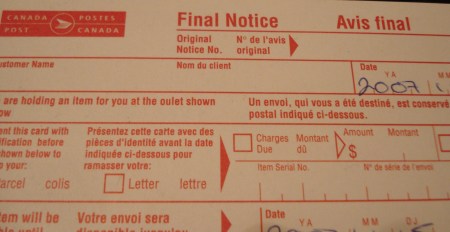
I’m often asked how to “order” a pencil or stationery item featured on my blog. Though online ordering can appear to be a great convenience, sometimes that’s not the case. We may simply be postponing our inconvenience.
The photo shows a Canada Post “Final Notice” – more on this later.
Some years ago, sending an item by courier, even to a residential address, was a serious transaction. If the address had a minor error, if you were out, if there was bad weather, it didn’t matter at all. These were the challenges that were accepted as part of the service – the reason one paid a generous surplus over postal delivery.
Today, basic courier services (used by a broad wealth of online retailers) offer almost no “service” at the final stage of delivery. Though they may charge up to $20 (US or Canadian), this includes one or zero visits to the destination, with a “notice” postcard (or similar) left. You then have to go to the outlet/office of the courier to get your item.
For anyone with a day job (possibly a good percentage of those buying online) – this can be the “inconvenience” part. Though the photo shows a Canada Post notice, I equally include Purolator, UPS, and Fedex. Getting one of these notices and being told that I have X business days to appear and claim my package at a remote, out of the way office is always inconvenient and stress inducing.
Preferable is a higher level of service, such as when I’ve ordered items from France or Malaysia, and found a DHL courier at my doorstep in the evening. (“We check if an address is residential, and if it is, try the customer in the evening.”, a courier said. That was enlightening. It should be more common, but it isn’t.)
Or – regular postal delivery – a box of pencils in the mailbox, the value of which doesn’t merit the courier surcharge.
Upfront, click and point ordering is clearly convenient, but all that has happened is that my trip outside the house has been delayed. And the trip is not to a nice local stationery shop – my visit will be to a lineup in a grim faceless suburban courier depot.
The flip side, retail purchasing at a store, has lots of merits. You can see the true colour of an item. You can explore the texture. You can feel it’s weight. If it’s something like a fountain pen, you can dip it and see if you like how it writes! You can even talk with a real fellow human being.
It may be more expensive than buying from an online vendor who has no main street commercial rent to pay, but today we often pay for convenience – and what’s more convenient than this – being able to examine an item in detail – and should it meets your needs – pay for it and walk away with it.
So anyhow, I’m hoping there will soon be a snowstorm free evening here. I just received a final notice for a waiting package.

I know what you mean.
At least down here it is common for DHL and others to leave a calling card if you are out advising a time they will return tomorrow for a second delivery attempt, and also a card authorising them to deliver to a specified neighbour or to leave (hide) it somewhere “safe” on your property. Having to go to the depot is a last resort.
Thanks for the comment. Here, DHL also offers some “options”.
I b’lieve we’re mightily spoiled here in the states on this very point. I’ve gotten things from all over the world without the slightest kvetch from the post office-including 200 vacuum tubes from Bulgaria not too long ago.
The service we get from USPS is uniformly excellent although I am told it varies in some areas.
Prairie Dawg, thanks for the comment. That’s good to hear that the USPS is doing well.
200 vacuum tubes? That’s quite a few. Is this for audio, or ham radio perhaps?
They’re for replacements in guitar amps. They’re all Reflektor, made in Saratov, and made in the sixties and seventies. They’re lovely, rugged and well made performers. The Russians put the date of production and the Soviet QTK quality inspection mark on every one which seems like a good idea. Of course the market crashed so I’m sitting on them. My day will come.
In a larger sense my old man always said I was studying for a doctorate in obsolete technology and I guess it’s true. Do you remember the TV show Banacek? George Peppard’s character is asked why he likes old stuff and he says, more or less, “Well, there’s only so much good stuff produced in any given year, so it stands to reason that most of the good things are old.” On the other hand, Rudy Vallee once said that nostalgia was overrated. He pointed to Packards and said they were bad cars in the ‘teens and they were bad cars later on. This ought to offend Packard aficionados worldwide, which means I’ve done good work on a cold and somewhat snowy Sunday in Iowa.